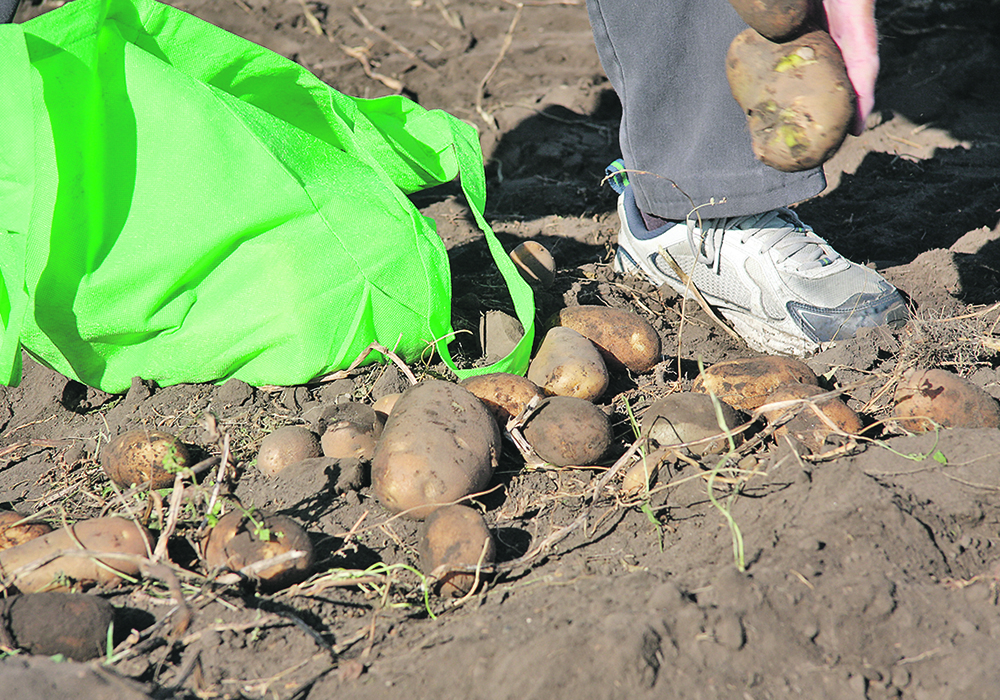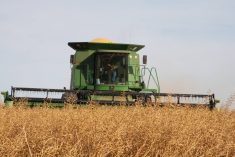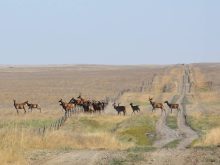An acre of freshly manured soil produced an abundance of spuds, which prompted a practical lesson in sharing the bounty
What would you do with a 30-year old massive manure pile at the edge of a field? Most of us would only give it a passing glance, but Mom and Dad had an idea.
It was spring 1967, and my parents had just bought a three-quarter section farm at Basswood, Man. We had moved out from northwestern Ontario, and they decided a farm would be a great place to raise their six children. Their likely rationale was that work would keep them out of trouble — at least that was my guess as a seven-year old.
Read Also

Crop quality looks good this year across Prairies
Crop quality looks real good this year, with the exception of durum.
After the snow melted, our parents walked the fields deciding what to plant where for their first crop. This manure pile though, half a kilometre from the farmyard, must have intrigued them.
In the vague history of our farm, it seems a neighbour hauled the manure over and piled it up. The neighbours were relatives and regularly helped each other with farm projects. One had long since sold out and little remained of the farm buildings. This mound was a remnant of previous inhabitants.
However, Mom and Dad, both raised on farms, knew the value of old manure — it was a fertilizer treasure. The pile was about 3.5 metres high, with about a 25 metre radius.
One day in mid-May, Dad fired up his Fordson Major tractor, and hooked up the deep tiller. He began to cultivate the pile’s edge closest to the field and dragged the soft brownish loam onto the field. It mixed well with the regular soil.
Dad even had bolted a plank inside the last row of curved shanks so that he could drag more of the rotted manure onto the field — an improvised earthmover.
I was only seven, but the loud roar, the smell of diesel, and spinning tires told me the Fordson was working hard.
In an hour, Dad had maybe an acre of mixed soil on the field.
The Mom came out to the field with the blue Chevy half-ton, loaded with children and a bag of potatoes. She began to cut the spuds up in halves and quarters, explaining they were seed potatoes. She filled several two-gallon milk pails as we found new ways to play in dirt.
Dad meanwhile made his final passes with the deep tiller, parked the machine to one side, walked over and grabbed a pail.
He ordered, “pay attention so that you can do it.” Here came the work.
Dad used his heel to press a hole in the soft dirt, toss in a cut potato, shove dirt on top, and take a stride forward — stepping on the buried potato — all this while holding the pail. He had great balance and a talented foot.
He explained he wanted the potatoes seeded about 14 inches apart. When he completed the row, he worked his way back using the next furrow. Got that?
With the older children in pairs (as my two younger brothers played “road building” in the dirt), and with Mom and Dad, we moved steadily. Time moves differently for a child, but I’d guess we had the acre seeded in two hours.
Dad pounded in a few stakes to mark the patch so that he wouldn’t seed barley over top. We piled into the seat and back of the pick-up for the ride home. Dad started the Fordson and headed home too. We were all dirty, tired and hungry. It had been our first experience as gardeners.
In June we went out to the potato acre, this time with garden hoes in the pick-up truck box.
We came across beautiful green plants in perfect rows curving gently around the southern edge of the manure pile. However, there were “thorns” among our potato “roses” — nasty weeds — the enemy.
We attacked the interlopers. With all the conscripted labour engaged, we had the invaders cleared in a few hours. We came back twice in summer for encores. This was work.
Dad took notice. A year later, he rigged a hitch to pull two vintage one-horse cultivator/hillers behind his small S Case tractor.
Older brother David slowly drove the Model S (the tractor had an easy hand-clutch lever). Mom and Dad walked behind and operated one each. The implements rooted out the weeds between the rows and shoved dirt against the plants. It was hassle-free and fast.
In early October and with the grain harvest complete, we returned to the patch one day after school. Mom and Dad had been digging potatoes, and us children came out to clean and gather them. The pails appeared again. Oh no, more work.
We lugged pails of potatoes as we filled grain bags on the half-ton. We wearily headed home hours later. Mom and Dad were especially tired from their day’s toil.
Once home, Dad removed a basement window, and we passed half-full bags through it and dumped them into a cool dark corner. Earlier, Dad had sectioned it off with plywood. The end.
Wait, though. The scenario repeated itself for three days until finally the spud crop was harvested and stored.
Good. Finished. Tired. Our parents mentioned their sore backs. The trade-off — potatoes heaped in the basement corner. The patch had been prolific.
Well the great heap didn’t last — it became a modest pile.
Mom called her three city-dwelling sisters in Winnipeg who drove out. Mom handed off bags of potatoes for them and their growing families. Trunks and back seats filled up. This actually happened throughout our 11 years on the farm. Maybe it was a good excuse to visit.
One sister had three sons older than Dad and Mom’s four, and so used clothes became part of the deal, and later, bedding and quilts, often homemade. Mostly though, Mom just gave the potatoes away.
For us children, we could not comprehend giving away what we had diligently laboured to obtain. However, Mom said it was the right thing to do. Plus, “hard work never hurt anyone,” was her response.
We never lacked for farm-fresh food — the 1970s potato patches guaranteed that: french fries, hash browns, potato pancakes, potato salad, potatoes roasted, boiled, or mashed.
In later years, the patch grew in size. Mom began selling the spuds cheaply through an ad in the local newspaper. I recall she charged $2 for a medium grain bag full. What a deal.
And if you couldn’t pay, that was OK. She said we were blessed with a lot.
We didn’t know it then, but Mom taught us gracious charity as much as Dad had taught us about growing potatoes.















